Riddle me this: what happened to the United States during the aughts?
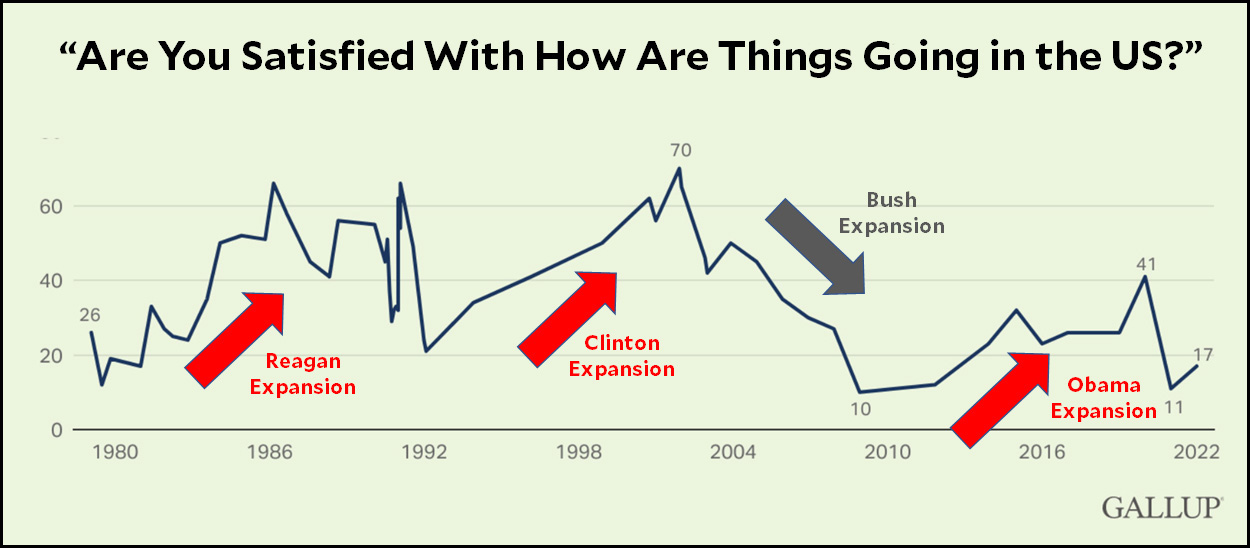 If you ask people how the nation is doing, it normally depends almost entirely on the economy. If we're in a recession, America is going in the wrong direction. If the economy is expanding, America is going in the right direction. We aren't complicated people, it turns out.
If you ask people how the nation is doing, it normally depends almost entirely on the economy. If we're in a recession, America is going in the wrong direction. If the economy is expanding, America is going in the right direction. We aren't complicated people, it turns out.
Most of the time, anyway. We all got more satisfied during the Reagan expansion of the '80s. And the Clinton expansion of the '90s. And the Obama expansion of the teens.
But then there's the Bush expansion of the aughts, when opinions about America went straight to hell and never recovered—despite the fact that personal satisfaction with our lives stayed high and steady. Aside from one outlier year in the Gallup poll above, the share of Americans satisfied with the direction of the country hasn't topped 30% since.
What happened around the year 2000 to cause this? There are (at least) four big possibilities:
- Bush v. Gore
- 9/11
- China's admission into the WTO along with the US granting them Permanent Normal Trade Relations
- The rise of Fox News
Let's go through them. After a decade of spadework from the likes of Newt Gingrich and Rush Limbaugh, #1 is what finally set off the red America/blue America brawl that still dominates American politics today. The 2000 recount debacle left both sides with a conviction that the other side had tried to steal the election.
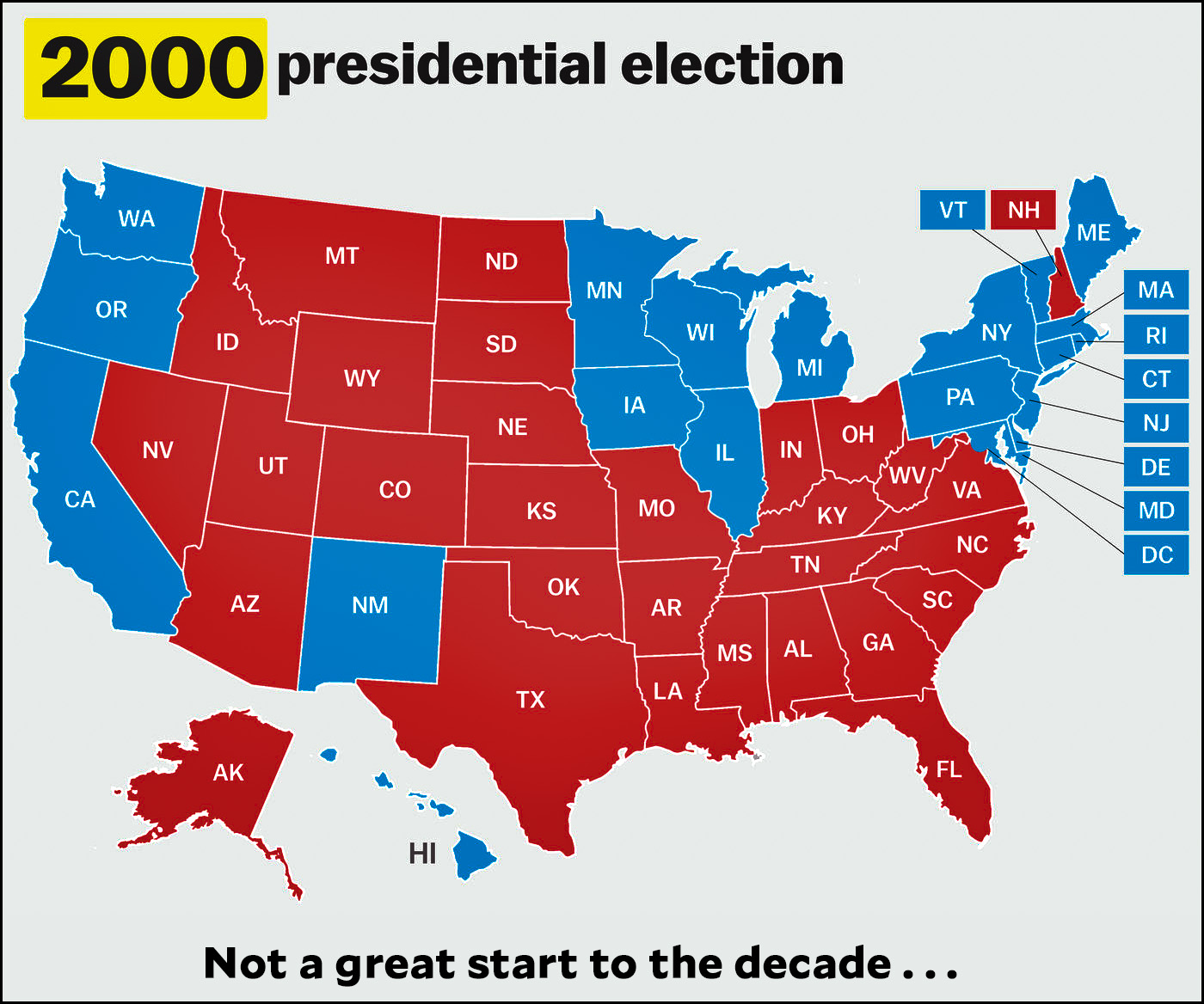 #2 produced a simmering background of fear and retaliation that permeated the country as we engaged in two overseas wars.
#2 produced a simmering background of fear and retaliation that permeated the country as we engaged in two overseas wars.
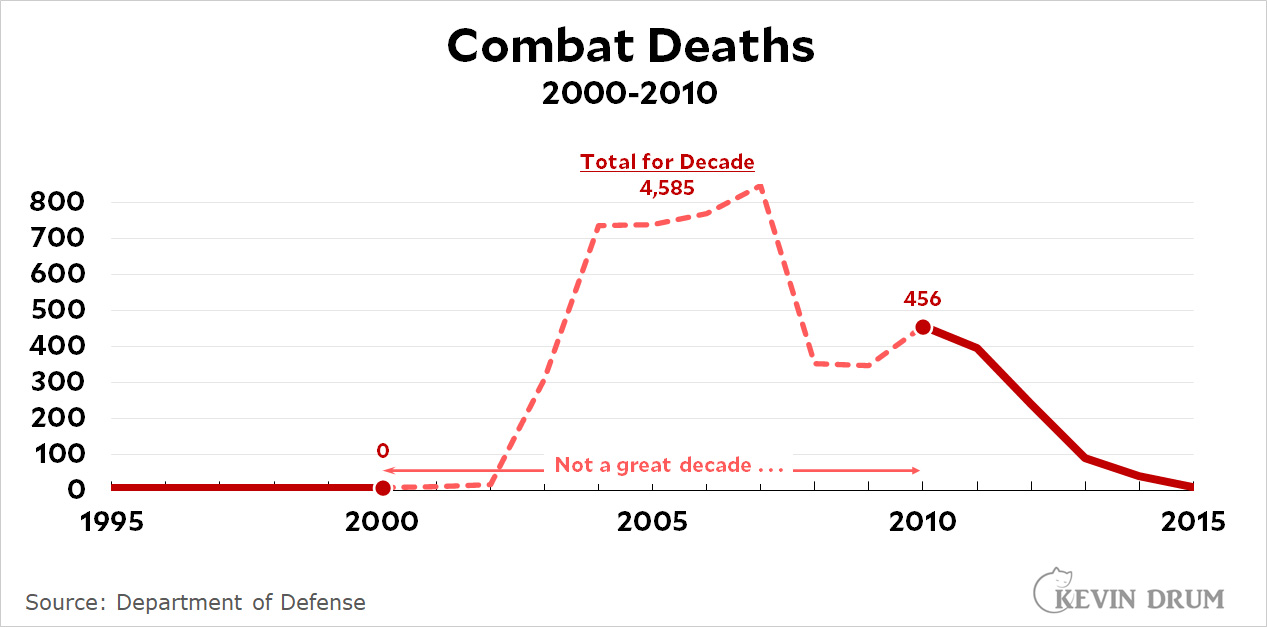 #3 sucked manufacturing out of the United States, producing a stagnant job market and causing millions of blue-collar workers to lose good paying jobs.
#3 sucked manufacturing out of the United States, producing a stagnant job market and causing millions of blue-collar workers to lose good paying jobs.
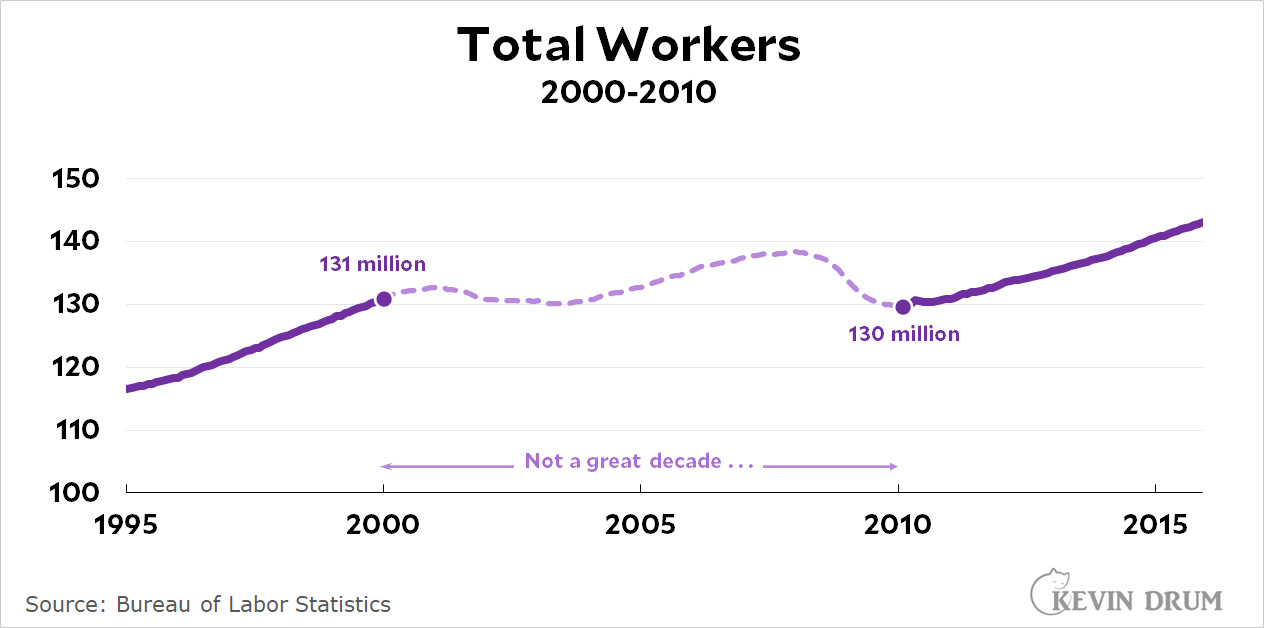
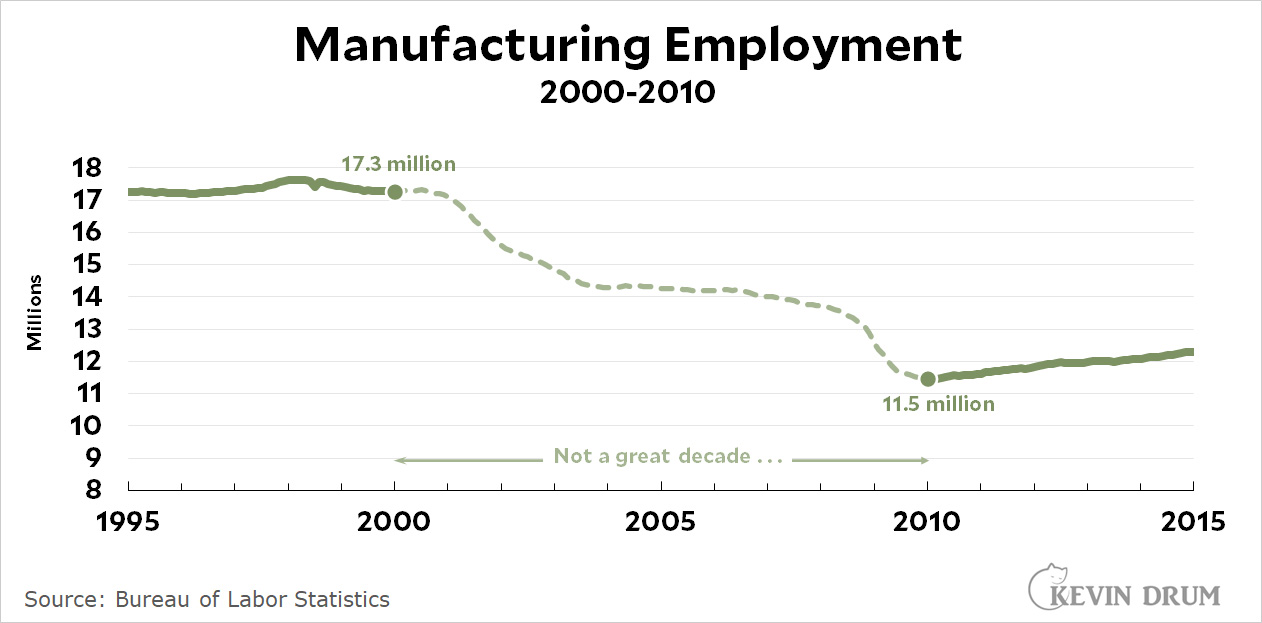
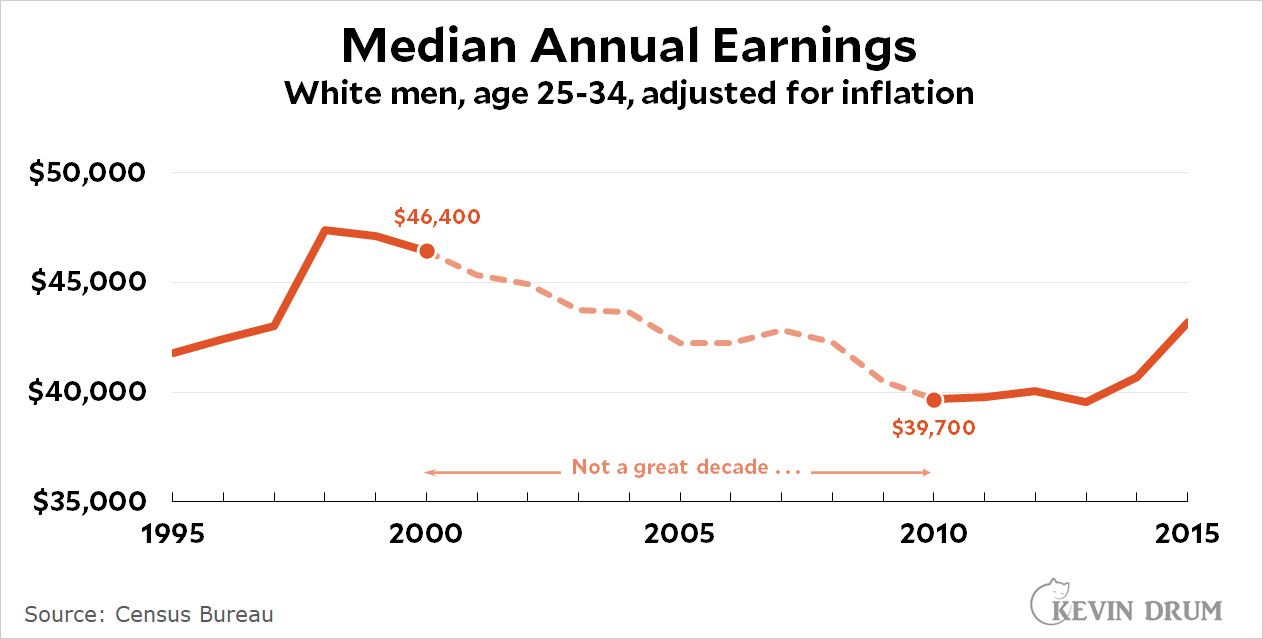 And with all that as background, #4 sealed the deal with relentless programming that built on this fear and blamed it on liberals:
And with all that as background, #4 sealed the deal with relentless programming that built on this fear and blamed it on liberals:
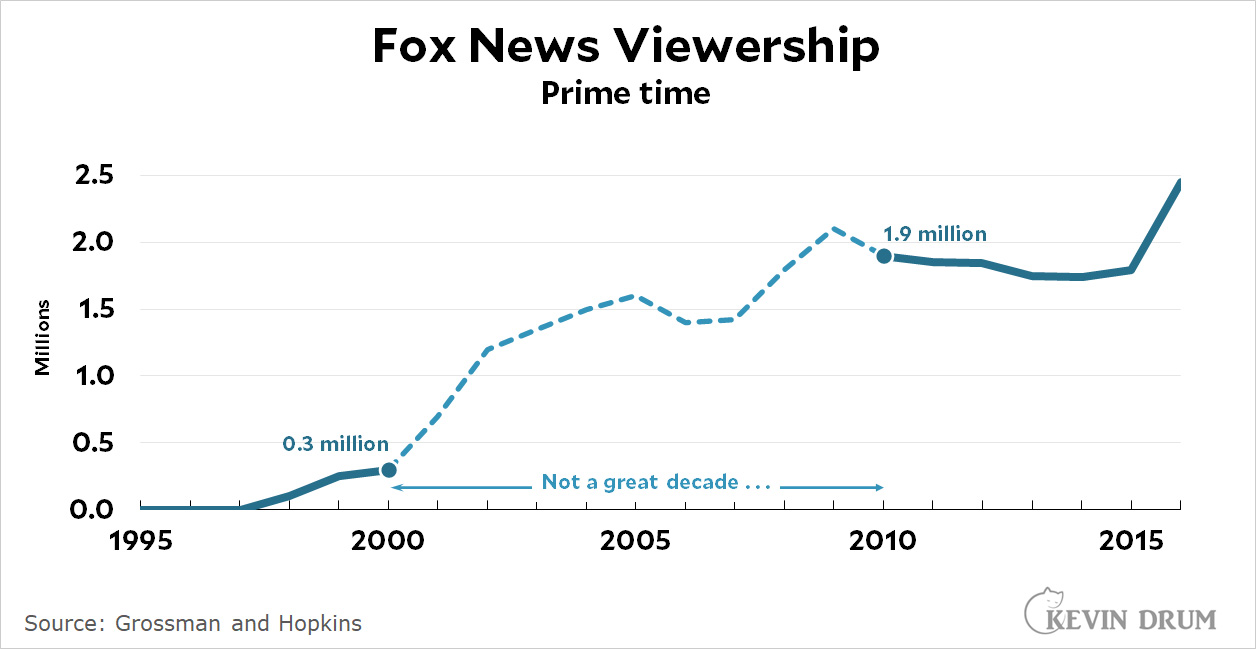 By 2010 we had a Black president and the job was done. By 2020 liberals had followed suit and we were as scared of conservatives as they were of us:
By 2010 we had a Black president and the job was done. By 2020 liberals had followed suit and we were as scared of conservatives as they were of us:
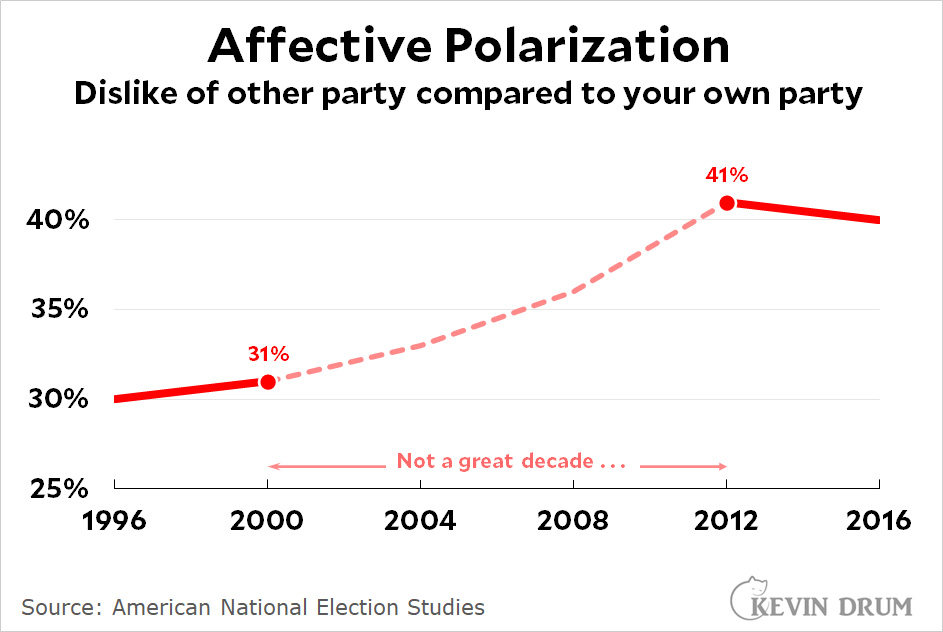 "Affective polarization" is the most important thing you've never heard of, but it's not complicated. It's just academese for "how much I hate the other party." Affective polarization was fairly low in the decades following World War II, increased a bit after Watergate, and then settled down for a couple of decades during the Reagan, Bush, and Clinton presidencies.
"Affective polarization" is the most important thing you've never heard of, but it's not complicated. It's just academese for "how much I hate the other party." Affective polarization was fairly low in the decades following World War II, increased a bit after Watergate, and then settled down for a couple of decades during the Reagan, Bush, and Clinton presidencies.
But in 2000 it suddenly started to shoot up. By the 2012 election, on average, dislike of the other party was 41% higher than dislike of your own party. By 2020 it was 52 points higher. It was no longer enough to say that Republicans merely disliked Democrats, they hated and feared Democrats:
Nearly a majority of Republicans (48%) gave the Democratic Party a zero on the 0-to-100 scale. This marks a nearly 600% increase in two decades. Slightly fewer Democrats (39%) give the opposition a 0.
....According to a 2020 poll from the right-leaning American Enterprise Institute, 64% of Democrats see Republican policies as so misguided that they pose a serious threat to the country. Among Republicans, 75% believe Democratic Party policies are so misguided that they pose a serious threat to the country.
Fears of political Armageddon are a bit lower among Democrats than Republicans, but they're catching up. In fact, these numbers are from 2020, and I wouldn't be surprised if the combination of the 1/6 insurrection; the ongoing Republican program to corrupt the vote; and the Supreme Court's Dobbs decision have brought Democrats fully even with Republicans in the hate and fear department. Let's check out a few quotes from both sides of the aisle.
On the left: Trump’s tilt of U.S. foreign policy in the direction of anti-democratic forces everywhere is reminiscent of fascist fellow travelers everywhere who justified repression and violence in the fight against the international left.
On the right: We, as a movement, are at war with the forces that want to destroy the American order, root and branch.
On the left: The Republican Party is the biggest threat to American democracy today. It is a radical, obstructionist faction that has become hostile to the most basic democratic norm: that the other side should get to wield power when it wins elections.
On the right: We are confronted now by a systematic effort to dismantle our society, our traditions, our economy, and our way of life.
On the left: If historians of the future are forced to record this country’s descent into tyranny, they’ll be required to sift through the grim record and identify a few decisive moments when the tide turned.
On the right: Democrats are purposefully trying to destroy our country as we know it in their quest to change America into the world’s next failed socialist state. From the open borders disaster, the defund police violent crime spike, critical race theory, choking off domestic energy production, to trillions upon trillions in wasteful spending — none of it’s a mistake. In fact, it’s all part of the left’s grand plan.
I could go on and on—and keep in mind that all of this is sincere. Conservatives believe that liberals routinely engage in mass election fraud and deliberately encourage destructive policies in order to bring down a nation they hold responsible for the world's ill. Liberals believe that conservatives have become a fascist cult that's openly trying to destroy democracy in order to keep power permanently.
So how does this end? On possibility is that it doesn't, and the United States falls to either fascism or moral collapse. Another possibility is that our intense hatred eventually burns itself out and we return to normal. Yet another is that, somehow, both Fox News and MSNBC are put out of business and we stop poisoning ourselves.
Other guesses?

I'm guessing the heat death of the universe will put an end to it.
For me, the Bush presidency was an indication that our political system didn't work as well as I had believed.
In 1976, Anwar Sadat called a peace conference between Israel, Egypt, and the Palestinians. That left Palestinian leader Yassir Arafat with a choice. He could have attended the conference and tried to obtain a deal that would advance Palestinian interests. Instead, he skipped the conference, pretty much ensuring that Palestinians would get nothing from the deal, but leaving Arafat with plenty of time to figure out how to spin the results. As far as I know he never paid any price for his decision to not even try to advance Palestinian interests.
Prior to Bush, American politicians didn't act like Arafat. I had thought that was because American voters wouldn't let them. Instead, it appears that American politicians thought voters wouldn't let them until Bush demonstrated otherwise. Before Bush, I thought that American voters might vote for policies I didn't like, but I didn't think they would vote for pure incompetence.
Good news, everyone!
Long covid will have you losing your hair and never ejaculating again, or even wanting to,
https://www.newscientist.com/article/2330568-long-covid-symptoms-may-include-hair-loss-and-ejaculation-difficulties/
But fatigue is the main problem with long Covid
So you just gave them cover
"I'm too tired tonite hon"................
Modern Seinfeld writes itself.
You will fear your ejaculate. Fear it!
Sounds like a University of Austin lecture by Jordan Peterson.
Kevin, does this seem balanced to you in some way? The belief that a vast swath of the country wants to destroy the same country they live in is baldly insane.
Big political movements, on the other hand, give up on Democracy all the time.
Finally, if you go back even eight years you won't find widespread belief that Republicans had turned against Democracy. What you will find is many warnings that constant demonizing of Democrats would lead to Republicans turning against Democracy.
For me, I was in my 20s during the aughts... And the expansion never seemed real to me. Maybe because I didn't have much experience living under economic cycles, but it was obvious to me that there was a bubble being formed. Plus, the reckless economic and tax policies of the Bush administration were sure to come due at some point. So why be happy about the economy when we're going to lose all the gains when the bubble bursts?
I don't think that was a fully accurate prediction. And I don't know how many other people shared that opinion. But that's my piece of anecdata
Pingback: Christian Lindner senkt die Steuern für Henri Nannen und bereitet die Machtübernahme in den USA mit Hilfe der Ungeimpften vor - Vermischtes 01.08.2022 - Deliberation Daily